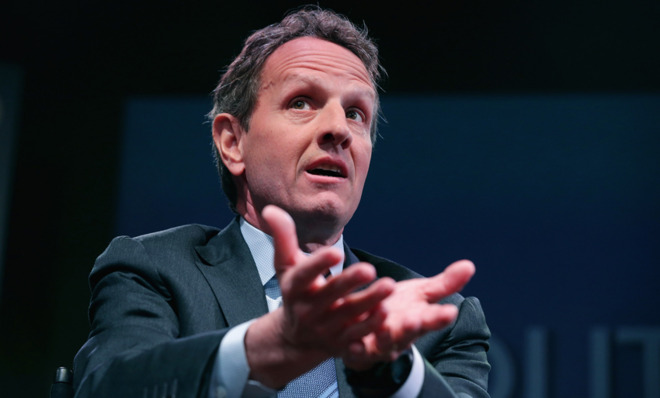Everything you need to know about Tim Geithner's defense of the Wall Street bailout — in 3 paragraphs
Geithner's new book offers an impassioned defense of the Wall Street bailout he helped orchestrate

A free daily email with the biggest news stories of the day – and the best features from TheWeek.com
You are now subscribed
Your newsletter sign-up was successful
Timothy Geithner thinks he did a "heckuva job" handling the financial crisis, said Paul Krugman at The New York Times. The former Treasury secretary's new book, Stress Test, offers an impassioned defense of the Wall Street bailout he helped orchestrate, arguing that throwing billions of dollars at the too-big-to-fail banks at the height of the crisis was the only realistic way to save the economy from total collapse. But with employment barely back to precrisis levels and long-term unemployment nearly three times higher than it was in 2007, you might be inclined to ask how Geithner can "feel good about track records that are objectively so bad." Clearly, he buys into the misguided and dangerous notion that the bailout was a success because Wall Street has rebounded. But bailing out the banks and leaving regular Americans to fend for themselves "wasn't just unfair, it was bad economics." To claim that his policies "saved" the economy shows a seemingly willful ignorance of the fact that "Wall Street is back, but America isn't."
But Geithner "rightly takes credit" for averting what could have been a devastating economic depression, said Albert Hunt at Bloomberg View. And he "makes a persuasive case that the government got most of the policies right." That was no small feat: An economic cataclysm was avoided and major financial institutions were restored to health, "ultimately at no cost to taxpayers." If Geithner is guilty of anything, it is failing to acknowledge that the government's "success came at a price," in the form of greater distrust of Wall Street, big banks, and Washington. Many of Geithner's economic defenses are on the mark, said Robert Samuelson at The Washington Post. But he misses an opportunity to come clean about why we failed to anticipate the crisis in the first place. Despite being repeatedly warned that the economy was "overdosing on credit," Geithner and others didn't take the threat seriously, confident that the U.S. "had outgrown panics" thanks to post-Depression economic reforms. Regulators put too much faith in economists' ability to control business cycles, and as a result, failed to heed the warnings gathering before them.
Which is why Stress Test should be seen as a warning of its own, said Sheila Bair at Fortune. In justifying his past actions, Geithner is also "trying to prep the public for future bailouts." That mindset reflects the "unspoken" view of Wall Street, where Geithner is now employed: "The system is still unstable, there will be another crisis," and banks will need to be bailed out again. Geithner's rationalizations signal that our fears of moral hazard were real: Wall Street wants bailouts, but the economy needs accountability. For if the banks "aren't held accountable for their behavior, they will commit the same offenses."
The Week
Escape your echo chamber. Get the facts behind the news, plus analysis from multiple perspectives.

Sign up for The Week's Free Newsletters
From our morning news briefing to a weekly Good News Newsletter, get the best of The Week delivered directly to your inbox.
From our morning news briefing to a weekly Good News Newsletter, get the best of The Week delivered directly to your inbox.
A free daily email with the biggest news stories of the day – and the best features from TheWeek.com
-
 6 exquisite homes with vast acreage
6 exquisite homes with vast acreageFeature Featuring an off-the-grid contemporary home in New Mexico and lakefront farmhouse in Massachusetts
-
 Film reviews: ‘Wuthering Heights,’ ‘Good Luck, Have Fun, Don’t Die,’ and ‘Sirat’
Film reviews: ‘Wuthering Heights,’ ‘Good Luck, Have Fun, Don’t Die,’ and ‘Sirat’Feature An inconvenient love torments a would-be couple, a gonzo time traveler seeks to save humanity from AI, and a father’s desperate search goes deeply sideways
-
 Political cartoons for February 16
Political cartoons for February 16Cartoons Monday’s political cartoons include President's Day, a valentine from the Epstein files, and more